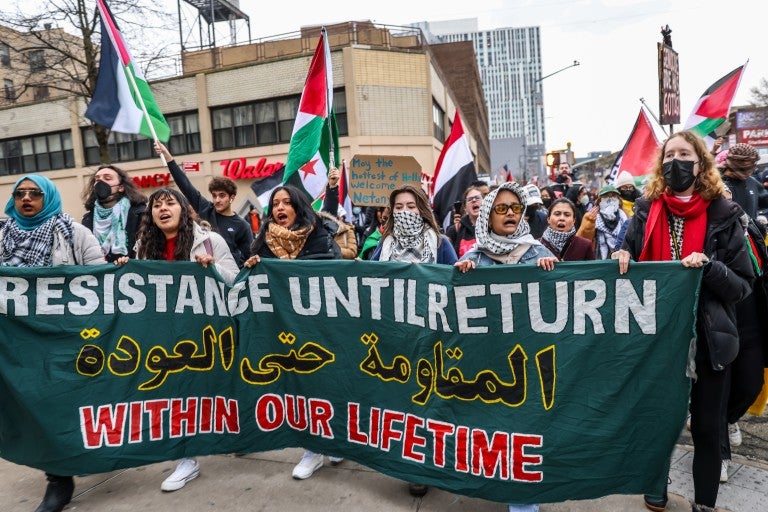October 19, 2023
This Q&A originally appeared in the National Journal. Interview by Cristina Maza.
You’ve been an advocate for Israel for many years. How did your relationship with the country begin?
My advocacy for Israel started in high school. There were just a handful of Jewish kids in my big high school, and I was the person people turned to when they wanted to understand Israel. Then I went off to college and continued my advocacy work.
As an attorney, I was involved with many nonprofits focused on Israel and strengthening the U.S.-Israel relationship. And then, for seven terms of Congress, I was proud to be a leader in the pro-Israel movement. I chaired the [Foreign Affairs panel’s] Middle East Subcommittee for 10 years, and I've always worked hard to advance Israel's place in the Middle East and the world and defend Israel's right to defend itself.
That's never been more important than now. During the year I've been in the American Jewish Committee, this is the most important time given what Israel is facing and the challenge of confronting the Hamas terror army that launched this vicious attack against Israel.
What was the main focus of the Middle East Subcommittee during the years you were in Congress?
We focused on the Arab Spring, and [Syrian President Bashar] al-Assad's horrific war against his own people in Syria was a big focus. The war in Yemen generated a lot of our attention.
But throughout, from the very beginning right until I left Congress, the one consistency is the focus on Iran and its ongoing violations of the human rights of its own people, its efforts to support terror around the world, to undercut and undermine governments throughout the region, and to advance a nuclear program that has dangerous intentions, and their ongoing efforts to generate opposition to Israel and launch terror attacks in Israel.
The most exciting piece for Israel was the opportunity to strengthen Israel's place in the region and eastern Mediterranean, deepening ties between Israel and Greece and Cyprus, and expanding Israel's relations worldwide.
And then the Abraham Accords, and the follow-up to the Abraham Accords, really helped to advance what we've all known from the beginning, which is [that] a world in which Israel is respected and is fully integrated benefits not just Israel, but benefits all of those countries who have relations with Israel.
How do you assess the Biden administration's support for Israel at this moment and its reaction to Hamas’s attack last weekend?
The entire Biden administration, starting most powerfully at the top with President Biden, has stood firmly with Israel in this war that Hamas launched against Israel. Whether it's the president's powerful words, his visit to Israel, or the actions taken by the secretary of Defense to help fortify Israel's defensive ability, the advocacy by Secretary [of State Antony] Blinken in standing up for Israel's right to self-defense, the administration has been incredibly strong, as we expected.
This is not a moment where there are two sides to the issue. This is a war launched by a terror organization that massacres children, rapes women, and kidnaps seniors and Holocaust survivors.
What about the response from Congress? Is there more Congress can do for Israel?
I've had many conversations with former colleagues and members of the Senate who are all committed to standing with Israel. They recognize what's at stake, not just for Israel but for the world.
This is not a moment for equivocation. Fourteen hundred people were slaughtered. Thousands more were injured. Two hundred and sixty young people were killed at a music festival.
These are some of the most barbaric, brutal, and horrific actions anyone can recall. So members of Congress, the administration, and leaders around the world are standing united against Hamas and recognizing Israel's need to defend its people and defeat Hamas. The Iron Dome system that saves so many civilian lives needs to have interceptors that can shoot down rockets. There is a greater need for additional items for Israel to be able to defend itself.
The administration sent two aircraft carriers to the region to send a message to Iran. That same focus also needs to come from Congress when it comes to Iran, and making sure that Congress is doing everything it can to ratchet up the pressure on Iran so that it's harder for Iran to support Hamas and all the other terror groups it supports throughout the region.
We have seen calls from Democrats, especially Democrats in the House, for a cease-fire. There's concern about the human rights of civilians in Gaza. Do you think that is a sign the Democratic Party is split on its approach to Israel?
There have not been a lot of calls for a cease-fire. The overwhelming majority of members of Congress are standing with Israel in its need to defeat Hamas.
Nobody suggested after 9/11 that we had no interest in defeating al-Qaida. And no one should suggest that Israel doesn't have a right to defend itself and to defeat the terror army that launched an attack against it.
There’s a way for all of this to end: for Hamas to surrender. But Hamas’s charter, which has been clear for 35 years, tells us that it doesn't exist to advance peace or defend the people of Gaza. It exists to destroy Israel and to massacre Jews. I think most people understand that.
What is your message to people who argue that the lack of a two-state solution and the occupation of Palestinian land is to blame for some of this cycle of violence?
Fourteen hundred people were slaughtered, some of them while they slept. Others went into their safe rooms, only to have the terrorists burn their homes down. Bodies of children were dismembered. Women were raped. Seniors were pulled from their homes, some shot to death, some dragged into Gaza and thrown into tunnels where they are held as hostages.
This is the most violent attack against the Jewish people since the Holocaust by a terror group that massacres women and children. There’s not a question of culpability here. Nobody would ask that question about any other terror attack anywhere else in the world.
What are the prospects for a two-state solution going forward?
Advancing a two-state solution was a priority of mine when I was in Congress, and it's something that AJC is committed to now.
The best thing that can be done right now to enhance the prospects for peace is for Israel to defeat Hamas, to defeat the terror group that uses its people—kids—as human shields, that takes millions of dollars that should be used to improve its society and instead uses that money to build tunnels and launch terror attacks.
The best thing we could do to help advance a two-state solution and improve the lives of Palestinians is to defeat Hamas.
Pivoting to the U.S., how concerned are you about the rise of antisemitism here?
I'm very concerned. We saw an increase in antisemitism before this happened, before Hamas attacked Israel, before the slaughter of so many women and children. And we know, sadly, from history that these sorts of attacks against Israel lead to increased antisemitism in the United States and around the world. So we're very concerned.


